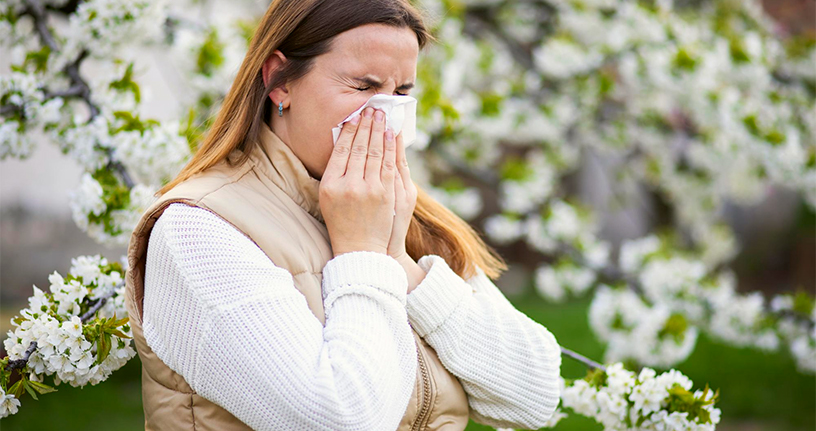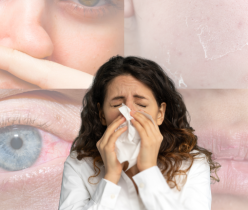Every new season brings some new feelings and new energy. But this change also invites annoying allergies and allergy concerns. Whether it is winter indoor allergies or fall allergy symptoms, we usually suffer from some seasonal allergy symptoms like coughing, sneezing, runny nose, rashes, itching, redness in eyes, hay fever, hair fall, itchy sinuses, sore throat, or ear canals, ear congestion, etc. Beware of some less common or rare fall allergy symptoms like headache, coughing, wheezing, shortness of breath, asthma, etc. The acute level of these allergies could be fatal, so keep some over-the-counter antihistamines to avoid any unwanted situations.
Most of the seasonal allergies do not last long, and one can find the best antihistamines for allergies and make some lifestyle changes to deal with such niggles effectively. While working on your lifestyle changes, you can also try some seasonal allergy medications like over-the-counter antihistamines, as well as some natural or homemade remedies for resisting the impact of seasonal allergies on your body.
Here are some effective tips that can help you treat seasonal allergies and achieve good seasonal allergy relief at a minimum cost.
Understand the possible triggers of seasonal allergies
Identification of allergic agents while going through the climate transition is very important. You may have infected yourself with some allergens like pollen, chemical dust, mold, bad breaths, pet dander, grasses, etc., in the previous winter, so be careful at the start of a new season. It helps you stay away from the potential risk elements and be prepared to deal with the condition. You can keep some medicines or pollen allergy treatments if you do not feel comfortable while combating an allergic attack. These medicines should be prescribed.
Avoid allergen exposure
To stay away from allergy triggers, try to stay indoors at high pollen times. Possible allergic reactions like dust particles or dust mites, insect stings, dander, and pollen can make you feel uncomfortable. Whether it is summer or winter indoor allergies, their impact is visible on the health of your skin, eyes, or hair.
The home’s HVAC system is helpful
HVAC stands for Heating, Ventilation, and Air Conditioning; it creates a system to make your home comfortable to live in. The absence of proper ventilation and a cooling system can invite allergic pollen mites and harmful chemical particles, which could infect you. The improved air quality and controlled humidity often work to avoid allergens. You can also use a High-Efficiency Particulate Air (HEPA) filter to remove dust particles, mold spores, and bacteria from the air to improve its quality. Those who are taking pollen allergy treatments are advised to install such systems to reduce the risk of airborne allergens.
Medication to manage seasonal allergies effectively
There are various medicines for treating mild effects of allergens triggering various allergies. You can access some over-the-counter antihistamines that are specifically formulated to resist the effects of histamine, a form of chemical released during allergic reactions. It is also advised to consult a health expert to find the best antihistamines for allergies that suit your body well, and these medicines are available in the form of nasal sprays, pills, syrup, and eye drops. Some common antihistamines like loratadine, cetirizine, and fexofenadine are widely recommended to find seasonal allergy relief.
Natural remedies for seasonal allergies
Summer allergy remedies and winter allergy remedies can go hand in hand and be managed with a combination of lifestyle modifications, prescribed and OTC (over-the-counter medications) products.
The use of some natural solutions for allergies is found to be effective enough to deal with the condition. People can get rid of fall allergy symptoms, nasal allergies, skin allergies, respiratory allergies, and pet allergies with the help of natural allergy remedies. Such natural remedies include:
- Use of honey to desensitize the body to pollen and other allergy triggers
- Steam therapy to get relief from sinus congestion and airway blockage
- Application of herbs like nettle, peppermint, and chamomile to combat seasonal allergy attack
- Use of eucalyptus oil as an anti-inflammatory agent to improve the respiratory health
- Intake of certain nutrients and food products rich in quercetin and vitamins
You should also use wearing masks, along with natural remedies for seasonal allergies. Keep your body hydrated, keep the house clean with proper air ventilation, and take foods rich in vitamin C as well as anti-inflammatory food items like apples, cherries, citrus fruits, honey, raspberries, green leafy vegetables, red grapes, etc., to reduce the intensity of allergic elements.




